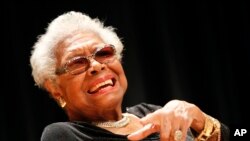The world is mourning the loss of poet and educator Maya Angelou, who died Wednesday at age 86. To get some perspective, we spoke with Don Share, the editor of Poetry Magazine, about Angelou's life and legacy for VOA's radio program Now!
BYRD: What do you think Maya Angelou’s legacy will be as far as poetry and as far as literature? What did she mean to the world?
SHARE: Well actually her legacy, which was very much a vigorous part of her own presence while she was around and while we were lucky enough to have her around, consisted of the fact that she connected poetry and literature with living, with real living. She worked in night clubs as a dancer, she was a fry cook, she worked in a mechanics shop taking the paint – we're told – off cars with her hands.
And so her life really ran the gamut of experience. And the result of that was the poetry that we are remembering her now for, but also for her legacy of generosity and kindness. She inspired people who maybe don’t have lives that seem like the subjects of poems or maybe people who have occupations that do not give them the luxury of reading or writing what we’re calling literature.
She appealed to those people because she always accounted for them and always communicated directly with them, understood them, and more importantly made them feel worth something. She was always full of a kind of energy – as her poetry was – that made you feel like life was worth living, and that surviving was good, and that being kind to people was our sustenance.
BYRD: She was also an educator at Wake Forest University but she said that comedians like Chris Rock or Richard Pryor as well as leaders in the African American community, people in literature and in poetry came to her almost to get some of the wisdom or some of the insight that she carried as her natural being.
SHARE: I think she did. I mean a lot of it was her shear charisma and energy. I mean we have to remember that she did have a career in TV and in film. She was the first black woman to have a screenplay produced in this country back in 1972 and she was nominated for an Emmy for being in the series Roots, and of course her book I Know Why the Caged Bird Sings was adapted by television for a movie of the same name.
So in a way there was something charismatic and even show business about her, but show business not in the shallow way that we think of with celebrities who don’t have any depth, but in a true sense of it which is that she was performing who she was – she was a character but that character was who she really was and that made you feel that you could be who you are. And I think that is an attractive quality whether you are just some person browsing through books or whether you are a movie star or another kind of celebrity or President of the United States.
BYRD: Did you ever personally meet Maya [Angelou]? Did you ever get a chance to talk with her?
SHARE: I have never spoken with her. I have heard her lectures – which are electrifying. There are recordings of them that people can listen to and I don’t think you’re ever the same when you hear her. She makes you laugh; she makes you stop and think; she encourages you; there was a rhythm in her speaking voice that was a kind of the rhythm of poetry. All very inspiring. But just to hear her voice could be an inspiration and to listen to what she was saying. And I think that’s why people are feeling her loss so keenly now: it’s almost like that voice will have to be heard now in retrospect.
BYRD: Do you have a favorite poem of hers? Many people have quoted her poem “Still I Rise” but do you have a personal favorite?
SHARE: I do. You know another poem you’ll hear people talk about is the Caged Bird, but I like another poem called “Awaking in New York.” It’s just a small poem, but it’s just so vivid and wonderful. And I can read it to you, actually.
BYRD: That’d be great.
SHARE: Yeah, so this is “Awaking in New York.”
“Curtains forcing their will
against the wind,
children sleep,
exchanging dreams with
seraphim. The city
drags itself awake on
subway straps; and
I, an alarm, awake as a
rumor of war,
lie stretching into dawn,
unasked and unheeded.”
BYRD: That is short, but that’s great imagery. Is there anything we’ve forgotten?
SHARE: The main thing that we’ll miss on the one hand but always carry with us through the work that will survive is that courageousness, that sensitivity, but also the toughness and sense of humor that it takes to get by. She made you feel like you could get through anything and that it was worth getting through. So I think that that’s something that everyone will always remain inspired by.
Don Share is the editor of Poetry Magazine. He spoke with VOA’s David Byrd from Amherst, Massachusetts.
BYRD: What do you think Maya Angelou’s legacy will be as far as poetry and as far as literature? What did she mean to the world?
SHARE: Well actually her legacy, which was very much a vigorous part of her own presence while she was around and while we were lucky enough to have her around, consisted of the fact that she connected poetry and literature with living, with real living. She worked in night clubs as a dancer, she was a fry cook, she worked in a mechanics shop taking the paint – we're told – off cars with her hands.
And so her life really ran the gamut of experience. And the result of that was the poetry that we are remembering her now for, but also for her legacy of generosity and kindness. She inspired people who maybe don’t have lives that seem like the subjects of poems or maybe people who have occupations that do not give them the luxury of reading or writing what we’re calling literature.
She appealed to those people because she always accounted for them and always communicated directly with them, understood them, and more importantly made them feel worth something. She was always full of a kind of energy – as her poetry was – that made you feel like life was worth living, and that surviving was good, and that being kind to people was our sustenance.
BYRD: She was also an educator at Wake Forest University but she said that comedians like Chris Rock or Richard Pryor as well as leaders in the African American community, people in literature and in poetry came to her almost to get some of the wisdom or some of the insight that she carried as her natural being.
SHARE: I think she did. I mean a lot of it was her shear charisma and energy. I mean we have to remember that she did have a career in TV and in film. She was the first black woman to have a screenplay produced in this country back in 1972 and she was nominated for an Emmy for being in the series Roots, and of course her book I Know Why the Caged Bird Sings was adapted by television for a movie of the same name.
So in a way there was something charismatic and even show business about her, but show business not in the shallow way that we think of with celebrities who don’t have any depth, but in a true sense of it which is that she was performing who she was – she was a character but that character was who she really was and that made you feel that you could be who you are. And I think that is an attractive quality whether you are just some person browsing through books or whether you are a movie star or another kind of celebrity or President of the United States.
BYRD: Did you ever personally meet Maya [Angelou]? Did you ever get a chance to talk with her?
SHARE: I have never spoken with her. I have heard her lectures – which are electrifying. There are recordings of them that people can listen to and I don’t think you’re ever the same when you hear her. She makes you laugh; she makes you stop and think; she encourages you; there was a rhythm in her speaking voice that was a kind of the rhythm of poetry. All very inspiring. But just to hear her voice could be an inspiration and to listen to what she was saying. And I think that’s why people are feeling her loss so keenly now: it’s almost like that voice will have to be heard now in retrospect.
BYRD: Do you have a favorite poem of hers? Many people have quoted her poem “Still I Rise” but do you have a personal favorite?
SHARE: I do. You know another poem you’ll hear people talk about is the Caged Bird, but I like another poem called “Awaking in New York.” It’s just a small poem, but it’s just so vivid and wonderful. And I can read it to you, actually.
BYRD: That’d be great.
SHARE: Yeah, so this is “Awaking in New York.”
“Curtains forcing their will
against the wind,
children sleep,
exchanging dreams with
seraphim. The city
drags itself awake on
subway straps; and
I, an alarm, awake as a
rumor of war,
lie stretching into dawn,
unasked and unheeded.”
BYRD: That is short, but that’s great imagery. Is there anything we’ve forgotten?
SHARE: The main thing that we’ll miss on the one hand but always carry with us through the work that will survive is that courageousness, that sensitivity, but also the toughness and sense of humor that it takes to get by. She made you feel like you could get through anything and that it was worth getting through. So I think that that’s something that everyone will always remain inspired by.
Don Share is the editor of Poetry Magazine. He spoke with VOA’s David Byrd from Amherst, Massachusetts.











